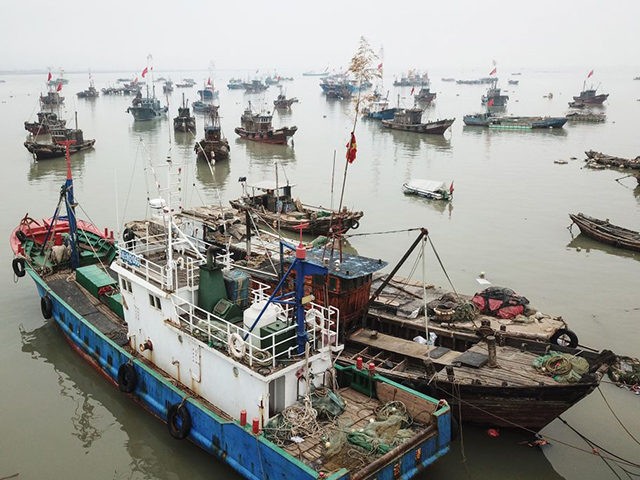Recently revealed satellite data shows that 700 Chinese vessels fished illegally in North Korean waters in 2018, violating U.N. sanctions on foreign fishing adopted in 2017 after Pyongyang’s testing of ballistic missiles, the Japan Times reported Monday.
Quoting a study published in the journal Science Advances on July 22, the newspaper reports that, in 2018, at least 700 vessels of Chinese origin illegally fished for Japanese flying squid in North Korean waters. In 2017, more than 900 Chinese vessels fished for maritime resources in North Korean waters.
“The vessels likely caught almost as much Pacific flying squid as Japan and South Korea combined — more than 160,000 metric tons worth over $440 million in 2017-2018,” according to the report.
The study’s authors analyzed satellite images to find evidence of illegal fishing “conducted by ‘dark fleets’ — vessels that do not appear in public monitoring systems” or publicly broadcast their location.
“In 2017, the U.N. Security Council imposed … sanctions prohibiting foreign fishing in North Korean waters as U.N. members sought to cut the country’s source of foreign currency. But some experts have pointed out that Pyongyang has continued to gain money by granting fishing rights to Chinese fishermen,” the Japan Times reported.
“[A]ny violations of these sanctions by Chinese vessels since September 2017 would constitute a violation of public international law and domestic Chinese law,” the authors of the study, Illuminating Dark Fishing Fleets in North Korea, said.
“Despite this, the South Korean Coast Guard has observed hundreds of vessels crossing into North Korean waters, and random inspections of these vessels by … [South Korea’s] East Sea Fisheries Management Service suggest that they are of Chinese origin,” the authors added.
According to the Japan Times, the study’s researchers “identified squid-fishing vessels by their large lighting arms used to lure squid and found they were from China by tracing their paths. It also picked out those vessels that move in pairs and spread a net together, a common Chinese fishing method.”
“The scale of the fleet involved in this illegal fishing is about one-third the size of China’s entire distant water fishing fleet,” said Jaeyoon Park, a senior data scientist at Global Fishing Watch, an ocean conservation nonprofit co-founded by Google. “It is the largest known case of illegal fishing perpetrated by vessels originating from one country operating in another nation’s waters.”
The illegal fishing — mainly of the region’s top seafood item, Japanese flying squid — poses a major challenge for squid stock management in the Sea of Japan, Yellow Sea, and East China Sea.
“T. pacificus [Japanese flying squid] is South Korea’s top seafood by production value, one of the top five seafoods consumed in Japan, and, until recent sanctions, was the third-largest North Korean export,” the study revealed. “Reported catches [of Japanese flying squid] have dropped by 80 and 82 percent in South Korean and Japanese waters, respectively, since 2003.”
“Japan’s catch of Pacific flying squid has fallen sharply since around 2000. The catch, which stood at more than 240,000 tons in 2011, dropped to 48,000 tons in 2018 and a historic low level of 42,000 tons last year,” the Japanese Fisheries Agency reported.
In addition to China’s squid poaching, the study also found that roughly 3,000 North Korean vessels fished illegally for various maritime resources in Russian waters in 2018.
“Competition from the industrial Chinese trawlers is likely displacing the North Korean fishermen, pushing them into neighboring Russian waters,” Lee Jung Sam of the Korea Maritime Institute, the study’s co-lead, said. “The North Koreans’ smaller wooden boats are ill-equipped for this long-distance travel,” he added, resulting in “hundreds” of North Korean boats washing ashore on Russian and Japanese coasts in recent years.
Many of these boats have been found “carrying corpses of those who apparently died at sea,” the Japan Times revealed. “These incidents often involve starvation and deaths, and many fishing villages on North Korea’s eastern coast have now been coined ‘widows’ villages.'”
The Japan Coast Guard says it recorded “104 such cases in 2017, 225 cases in 2018, and 158 cases last year.”

COMMENTS
Please let us know if you're having issues with commenting.